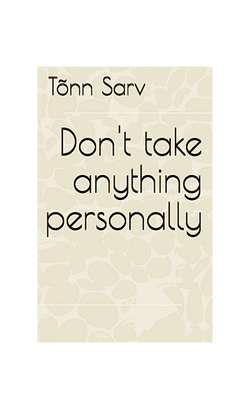Читать книгу Don't take anything personally - Tõnn Sarv - Страница 3
How to become better
ОглавлениеNo one’s perfect. Everyone makes mistakes. It’s not that I’m the one and only who’s always right and honest, and everyone else is guilty, wrong, a liar and a cheat.
Oh no, I’m sure I’ve made mistakes too. Surely someone has had to suffer because of me, to be offended, to depend on me and be let down, to endure losses, and perhaps at the time I didn’t realise or understand it myself. Who, then, would say such a thing to you in hindsight? Rather, he holds a fist in his pocket and when the opportunity comes, he pays you back.
Yes, it’s all about people. You smile and they are smiling, you forgive me and I forgive you, I apologise and they apologise to me.
Well, it sounds good, but it doesn’t necessarily get any better if we get better, as everyone finds out at least once in their lifetime. You do good for someone, but there’s no way out of it, and maybe you will abused. And so the desire to get better disappears, for what if it doesn’t work and nobody cares?
People’s rigidity and maliciousness beset us, and this can be mutually grating. It’s not going to make any difference, it will just get worse and that’s all there is to it, the evil and the rigidity keep deepening.
Yet there are a number of ways to escape from this vicious circle. It is enough just to take the initiative and tone down your own self-sustaining self-justifications. Why should I be right about everything? How can it be that everyone is wrong, but not me?
So, it’s enough to admit that I can be stupid about some things; it’s a very big step in the right direction.
But what’s stopping me? Fear, fright and false pride. As if by only daring to admit I was lost, I would lose something important, lose myself, shatter my peace of mind.
Actually, it is, of course, the opposite. The less we justify ourselves, the more leniently we approach ourselves, the more peaceful we are, and peace of mind comes.
Acknowledging your own mistakes is only the first step. Because if I’ve been seen to do something wrong once, it’s probably happened several times. Not only the doing, but also the undone, the neglected, the lack of attention, even forgetting may be quite a mistake. Cheating on someone’s hopes may sometimes be a crime.
You already know how to ask yourself, what’s been my greatest mistake or error? Or perhaps the question should be, what’s been my worst act, my greatest fault? How many have had to suffer because of me?
You don’t have to start looking for self-justifications again, you don’t have to have a sense of regret or blame yourself. It’s enough to admit it to yourself, to understand that, yes, I was wrong, I did the wrong thing, I caused the suffering. You don’t have to stay on your knees, to suffer for it, to blame yourself and to punish, to apologise and to excuse. There’s nothing more you can do about it anyway, and you can’t change the past.
These are the first steps to getting better: understanding, realisation, recognition. This will lead to a release, and more will follow, and it may eventually go far enough to bring you more confidence, friendliness, love, joy and even happiness.
That’s how to become better.
